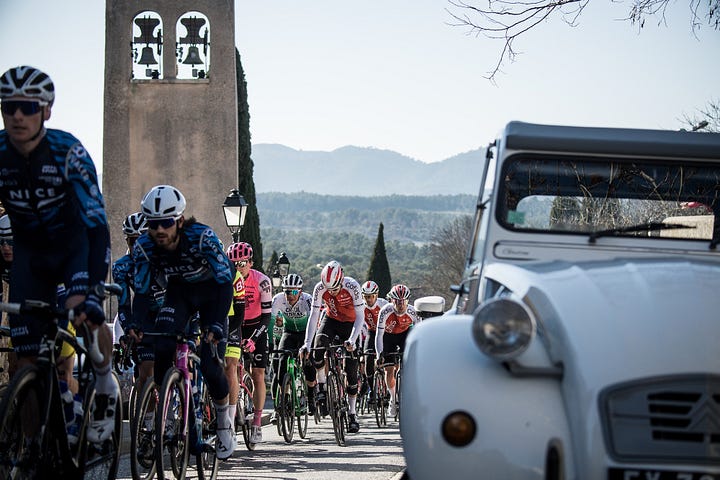
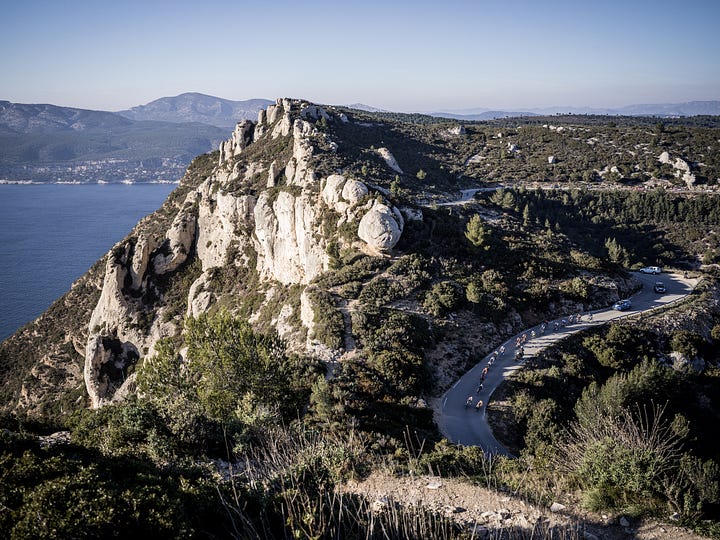
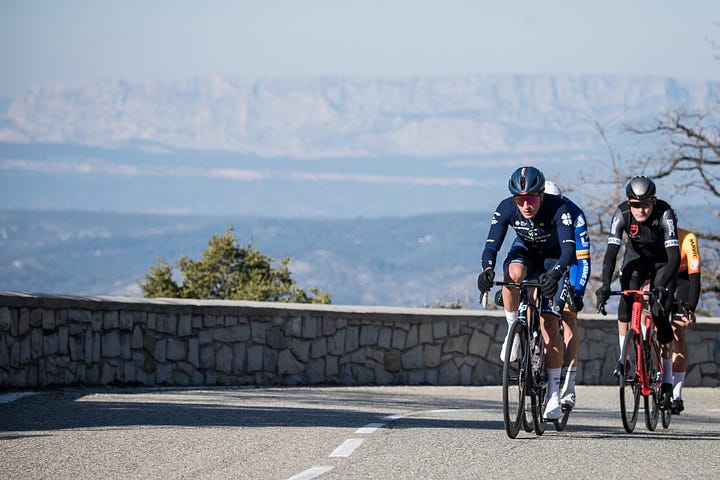

by Lionel Birnie
At the end of January, Simon the Photographer and I got into The Cycling Podcast’s broomwagon and headed to the south of France. Destination: Marseille.
We were off in search of pastis, bouillabaisse, winter sunshine, and the opening race of the French season. And to see François Thomazeau, who has lived in the city for much of his life. François was our guide and although we packed a lot into our long weekend he still felt we’d barely scratched the surface of one of France’s most interesting and vibrant cities.
The resulting five-part mini series was brilliantly pieced together by our producer Will Jones and is online now for Friends of the Podcast subscribers. I really enjoy working on episodes like this, setting off with the recorder not knowing quite what we’ll capture, and then collaborating with one of our supremely talented audio editors to create something that is part-travelogue, part-cycling documentary.
François is heading towards semi-retirement – he says he’s done his last full Tour de France – and one reason for making the trip to Marseille was to say thank you on behalf of The Cycling Podcast and all our listeners for his contribution over the years. He first appeared as a guest during the 2014 Tour de France, after stage nine to Mulhouse, when Tony Gallopin took the yellow jersey, meaning a Frenchman would wear it on July 14, which we know as Bastille Day.
Our episode started with a blast of La Marseillaise to mark that fact as much as to herald François’ appearance on the podcast. Richard described La Marseillaise as everyone’s second favourite national anthem after Flower of Scotland, which got a laugh from François. We then mentioned the sauerkraut which had been among the offerings at the presse buffet in the Mulhouse Expo centre. Naturally, Richard and I arrived too late to sample it but François said it had been a decent representation of the dish. It was at that moment I realised François was going to fit right in. He got what we were trying to do with the podcast straight away and added his Anglophile French flavour to every appearance since.
I probably shouldn’t have been surprised at his ability to weave the culture and history of the country into our conversation about the sport because since 2007 François has written the Guide Touristique for ASO. That’s the book given to journalists and broadcasters covering the Tour, containing all sorts of interesting historical and geographical information. His knowledge of the nooks and crannies of France, its cheeses and chateaux, is second to none.
François popped onto the podcast a few times during the 2014 and 2015 Tours. Then, in 2016, Daniel became Television’s Daniel Friebe, completing his big-money loan move to ITV. Richard and I decided the best way to fill the huge void in our line-up was a rotating cast of guests, each of whom would add their own unique perspective. That summer we were joined by, among others, Caley Fretz, Andy Hood, Daan Hakkenberg, Seb Piquet, David Millar, Ciro Scognamiglio and François, who popped up more frequently than anyone else.
After stage two, we recorded our episode overlooking a horse racing course on the outskirts of Cherbourg.
There’d been a kerfuffle in the Tinkoff team at the finish because Roman Kreuziger rode so hard on the front for Peter Sagan that their teammate Alberto Contador, who had crashed the previous day, lost touch with the rest of the favourites and conceded a chunk of time. Sagan won the stage, which mitigated against the fallout somewhat, and afterwards both he and Kreuziger said they thought two riders had still been ahead of the peloton, hence the ferocious pace.
‘To me this is bullsheet,’ said François. ‘It’s bullsheet the Sagan way. We like the way he bullsheets us and he’ll probably bullseet us again.’
Richard apologised for the language.
‘I’m French so it’s okay,’ said François. ‘I don’t know what I’m saying. Maybe it’s because we’re at a horse racing track, so maybe it smells of the word.’
A catchphrase was born.
By the following year it was apparent that Daniel would not be able to juggle the podcast and his ITV job, so Richard suggested we ask François to step in as a permanent third host for our Tour de France coverage. For the past six summers François has joined us in his nest in the back seat of the car, adding his experience and knowledge to the podcast and ensuring we always have somewhere booked for dinner.
La Marseillaise plugs into François’ knowledge of his home city and over the course of five episodes we learn about the newspaper which created the race, the paper’s communist origins and Marseille’s reputation as a rebellious city and important stronghold of the French resistance during the Second World War. We made a trip to the Stade Vélodrome to see Olympique de Marseille play. We talked about Bernard Tapie, who owned the football club during its greatest and also most controversial era, and who revolutionised cycling in the 1980s with its million-dollar salaries and clipless pedal technology.
Of course, we’re The Cycling Podcast and so while diversions are to be expected, we must always remember to bring the discussion back to cycling. It was remarkable just how easy it was to join the dots of Marseille’s history and culture and connect them to the sport.
Long-term listeners will know I often joke that Omloop Het Nieuwsblad is the first proper race of the season. The Grand Prix La Marseillaise, the first race of the French season, comes two weeks after the Tour Down Under gets underway and a full month before Omloop. It used to be called The Grand Prix d’Ouverture, which translates as ‘the opener’. The atmosphere was similar to many of the early season races in the south of France I’ve covered before. Etoile de Bessèges, the Tour Méditerranéen, the Tour du Haut Var. All are characterised by bright blue skies, watery sunshine, crisp, cold air, and a sense that the bike race is incidental to everyday life, weaving its way through the countryside, towns and villages while volunteers in gilets jaunes hold back the traffic just long enough to let the break and the bunch pass.
The highlight of the weekend was eating the city’s trademark dish, bouillabaisse. There’s a lot of debate about what should and shouldn’t go into it. At Chez Loury we were served a bowl of soup followed by a selection of fish, followed by another bowl of soup. It was the culinary equivalent of turning on the recorder and seeing what happens next.
Most of all, though, it was a pleasure to spend time with François in his home town. When we parted ways at the Vieux Port on the Sunday evening, I hoped it was à bientôt rather than adieu. Hopefully he will join us on the podcast from time to time. As we all know by now, he is a man of many talents. A sports journalist, novelist ( readings from his book Marseille Confidentiel feature in the podcast series), a restaurateur, a waiter in Doncaster back in the day, and a musician. As we were putting the episodes together I asked him if there was any music that said ‘Marseille’ to him and he sent through a link to a track called Marseille ou Kingston, from 1980, by a band called Special Service ‘with a guy named FT on bass’. And with that we had the theme tune for our podcast series.
La Marseillaise is online now. Sign up as a Friend of the Podcast to listen to all five episodes, and our archive of more than 80 other episodes made exclusively for subscribers over the years.




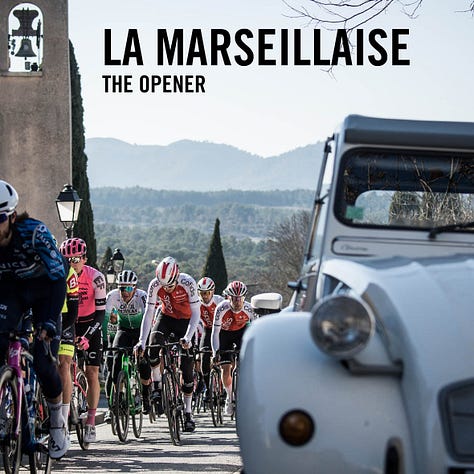

Rubbing shoulders with giants
Explore returned recently with an episode called Rubbing Shoulders with Giants, featuring American cyclo-cross rider Ben Frederick.
When we created the spin-off show, initially called Brevet, we wanted to ensure it wasn’t just about hardcore bikepackers cycling 500 kilometres into the wilderness and sleeping under a sheet of polyester by the roadside. There was room for those kind of epic tales but we wanted to make the series relatable to all sorts of cyclists and remember that for some riding a hundred miles can be a challenge.
Ben’s story was inspiring for a different reason but it is relevant to anyone who rides a bike. He was one of the most talented riders on the American cyclo-cross scene when he suffered what should have been an innocuous crash in training one day. He fell head-first in sand, which conjures up a sort of cartoonish image of a soft landing but was actually anything but. The sand meant there was no skid, nothing to dissipate the energy of his crash and so his brain collided with the inside of his skull causing a serious injury. At first he just felt dazed, but within a few minutes he knew something was badly wrong.
The concussion was severe. He had to learn how to read again. He had to complete a detailed mental checklist just to manage basic tasks like making a cup of coffee or a bowl of oatmeal. It was almost two years before he raced again.
At Christmas he travelled to Europe for the first time to take part in the prestigious Belgian cyclo-cross races at Diegem, Baal and Koksijde. He stayed at the Flandrien Hotel, owned by friends of the podcast Jamie Anderson and Bernard Moerman, and immersed himself in Flemish culture for a week or so.
While in Belgium, Ben lined up alongside Wout van Aert, Mathieu van der Poel and Tom Pidcock in the races – the giants of the cycling world – albeit a few rows back on the grid, and got to experience what it’s like to be in their orbit for a while.
With Van Aert and Van der Poel set to resume their rivalry on the road at Strade Bianche in a couple of weeks’ time, it’s an engaging listen not just for the story of Ben’s comeback from a point where he feared he might never race again.
The beauty of Explore is that the episodes are not particularly time sensitive so if you want to catch up on the adventures fast or slow, long or short, there’s a playlist here.




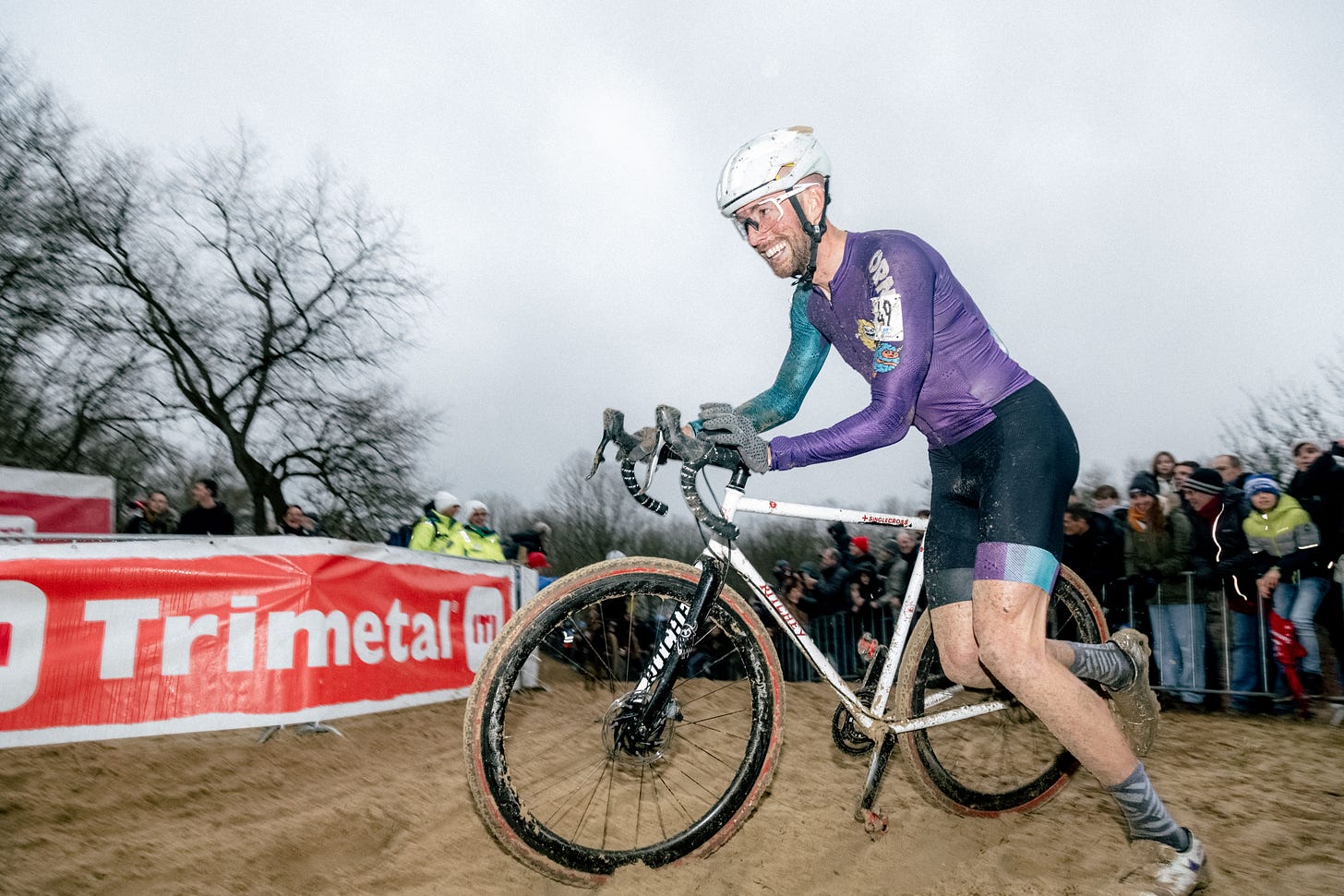
Thank you for yet another wonderful series, La Marseillaise. It was a joy to listen to, and I learned so many interesting things.
When listening to your podcasts, it really does feel like I'm in a room listening to a conversation with friends (I'm the silent one!). I look forward to them. Keep up the good work.
Another superb piece and podcast series Lionel. These stories feel so personal, relevant, insightful, fresh. Bloody brilliant.